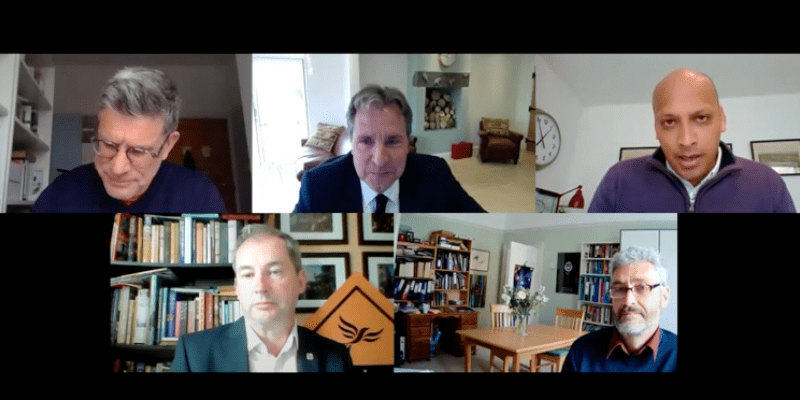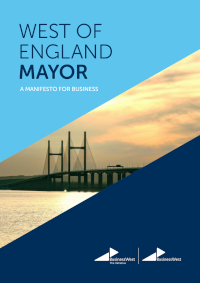
With less than a week to go until voters in Bristol, South Gloucestershire and Bath & North East Somerset decide the next West of England ‘Metro’ Mayor, more than 100 businesses logged on to quiz the candidates at a virtual hustings event organised by Business West and Centre for Cities.
The event took place against the backdrop of growing concern regarding the political profile that the role commands. In recent weeks, both Business West and Centre for Cities have published research findings suggesting that the national and international profile enjoyed by Mayor of Greater Manchester Andy Burnham and Mayor of London Sadiq Khan, for example, far outshines that of the West of England. A factor that could hinder inward investment in the region.
Centre for Cities Chief Executive Andrew Carter chaired the event and made a brief introduction to set the scene before Bristol Chamber President Richard Bonner said a few words highlighting the role the business community has played in “advocating for West of England Mayor”.
The four candidates were then invited by Andrew to provide 2-minute opening statements outlining how they “plan to support the West of England economy” once in post.
Ex-Labour MP, for the now-defunct constituency of Wandsdyke, Dan Norris was first to make his pitch to voters, expressing a deep affinity for the region and highlighting his political credentials as a former Minister, MP and Bristol City Councillor.
Addressing the need to turbocharge the role of West of England Mayor and establish it as a political heavyweight, Dan pledged to return the West of England “to the national and global stage to be the force we need to be”.
Following the Labour hopeful, Jerome Thomas - a businessman and Green Party Councillor representing the Clifton ward - stated that the right candidate for the job would need to work across local authority boundaries to broker deals, whilst “having realistic ambitions” about what can be achieved. The former management consultant then called attention to his “strong understanding of business” pointing to the fact that he now runs a successful local business employing 80 people.
Stephen Williams is the Liberal Democrats candidate, who stood in the 2017 Mayoral elections coming third.
The former Bristol West MP highlighted the uniqueness of the West of England economy, contrasting the West of England with other devolved regions such as Greater Manchester.
“We’re a mixture of a large city, smaller city and 100 towns and villages,” he said, pointing to his time served as a DCLG Minister in the coalition government as evidence of his deep understanding of the structure of the region’s economy.
Following in the footsteps of incumbent Tim Bowles, Samuel Williams is the Conservative Party candidate, who laid out a commitment to “work with government to unlock investment in the region” and “work with you as business leaders” to accelerate the West of England. He then went on to list his key priorities as green jobs, a transportation system fit for the future and building more homes.
Following the opening gambit, attention turned to audience questions.
The first question, posed by Business West’s Initiative Manager Victoria Matthews, asked candidates to identify the “first major economic decision” they would make if elected.
Getting the economy going after COVID and welcoming North Somerset, South Somerset and Gloucestershire into the WECA fold was the response from Samuel Williams.
In broad agreement regarding the importance of the post-COVID recovery and expanding the geographical reach of WECA, Stephen Williams added that he would consult with local businesses to shape an economic action plan, whereas Jerome Thomas said he would immediately oppose the proposed development of Bristol Airport.
Dan Norris took a slightly different tack and spoke directly to recent criticisms of the role of Mayor highlighted by Business West and Centre for Cities surveys.
He pointed to the fact that there was “nothing for us” in the recent Budget as evidence that the West of England is being left behind. If he is elected, he would remedy this situation by being “clear and resolute for the region” adding that he was “not going to rollover and take it lying down.”
The second question came from PWC’s Katherine Finn who asked: how will you ensure that the West of England doesn’t lose out in term of future investment?
“Building on business and the creative assets in our region” was the response from Jerome Thomas, who highlighted the region’s green credentials and how they help us to stand out.
Dan Norris continued on the theme of strong leadership, suggesting that an “iron fist in a velvet glove” and an understanding of how decisions are made in Whitehall are required to secure future investment.
Stephen Williams expressed his commitment toward setting up a West of England investment fund backed by the British Business Bank to try and replicate the success of the Northern Powerhouse.
Stephen also highlighted his familiarity with the inner workings of government, stating that the role of Mayor was “not a job for someone learning on the job”, before decrying the lack of transport investment in our region.
Samuel Williams said he would seek to open up the region to international trade, work in collaboration with business to identify investment opportunities and ensure that we are seen in central government as a unified region.
Samuel said there was appetite in central government to get behind the region following a recent conversation with Local Government Minister Robert Jenrick and that he aimed to replicate the success of West Midlands Mayor Andy Street.
Digging down deeper into the issues, there were questions regarding candidates’ plans to facilitate the transition to a low carbon economy and issues surrounding greenbelt, before Chair Andrew Carter spoke about housing.
“There is a huge disparity between the cost of housing and local salaries, particularly in Bristol and Bath, how will you solve this?” he asked.
Stephen Williams - a former housing Minister – said it was an issue he has long been aware of and that the situation in Bristol and Bath mirrored that in Oxford and Cambridge.
He went on to suggest that renting is “astronomically expensive” for young people and must be addressed and that to solve the housing crisis “everywhere needs to build more homes” and that these homes need to have effective transportation links to make for “socially balanced communities”.
To achieve his aim, Stephen said he would set up social enterprise to build more homes across the region.
Steps that will be taken to address the issue by Samuel Williams include an increase in affordable homes, putting a stop to landbanking and encouraging developers to adopt more modern methods of construction, whereas Dan Norris identified measures to reduce the cost of land, prioritise construction on brownfield sites and the utilisation of land owned by Duchy of Cornwall.
“Rising house prices have become a national religion” was Jerome Thomas’ retort, highlighting the fact that the younger generation had effectively been “locked out of owning their own home”. To resolve the issue, he called for a national policy shift that incentivises downsizing and more modern new builds.
Next on the agenda was the issue of transport in the West of England and how the candidates would seek to integrate the network across the region.
Dan Norris said that his aspiration was for the West of England to replicate the mass transit system that “London is enjoying”, where “no one is thinking of using a car” because people “know a bus or tube will turn up on time”.
He said he was in favour of “looking at what works in other places and bring it to our region” and learning lessons of the past, such as the failed Bristol tram project in the noughties, adding that he would sell transport investment in the region as an investment in ‘Great Britain plc’ given our strong regional gross value added (GVA).
Stephen Williams said that he was somewhat cold on adopting a Transport for London-type model for the West of England and suggested that tangible service improvements rather than a complete overhaul is what is required.
Solving the “regional jigsaw” and bringing North Somerset into WECA would be key to solving the transport issue he added.
“The integration piece is absolutely key,” said Samuel Williams. “Now is the time to seize opportunity and not undo the work that has been achieved by Tim Bowles” he continued, identifying an integrated ticket system and close partnership with transport providers as priority actions.
Work on an integrated ticketing system needs to be built on, said Jerome Thomas, who also pressed the need to raise awareness of region wide ticketing offers as well as a review of season tickets in light of COVID.
Questions that followed addressed issues such as active travel and jobs for young people in light of the pandemic. It was then over to Social Communications’ Ben Lowndes, who highlighted the importance of bridging the political and geographical divides between our local authority areas, asking what steps the candidates might take to overcome these.
Samuel Williams said that cultivating relationships with the Mayor, council leaders and with central government are key.
Stephen Williams pointed to his role in the coalition as evidence that he is “not a tribalist” and said that he would work to “re-establish bridges blown up over the years”.
Dan Norris said strong leadership was required and that he “doesn’t care if people don’t like me anymore” and as a result was firmly fixed on job in hand.
Jerome Thomas said most people don’t know what WECA is and feel alienated from it and would therefore work to raise its profile.
Chair Andrew Carter asked the final question of the afternoon, asking candidates for their views on North Somerset becoming part of WECA.
Each of the candidates responded positively, but with Dan Norris and Jerome Thomas expressing certain caveats.
After nearly two hours of discussion, the candidates were invited to provide their closing statements.
The Conservative candidate Samuel Williams said he would work to enable the West of England to “take centre stage as a leading economy” nationally and globally.
Stephen Williams invited audience members to read his ‘Agenda 2030’ manifesto and reiterated his commitment toward championing the region on a national and international stage, before adding that he has “got key relationships and knows how the system works”.
A Green Party metro mayor would be an “amazing asset” for the region, said Jerome Thomas - one which would send a vital message about the importance of climate change.
Lastly, Labour’s candidate Dan Norris reiterated his commitment to “leading from the front, showing strong leadership” and getting the region the recognition it deserves.
Following these statements Centre for Cities Chief Executive Andrew Carter brought the hustings event to a close thanking the candidates, audience and Business West for their input and encouraging everyone eligible to vote to ensure the new Mayor has a direct mandate to get to work straight away.
- Log in to post comments

